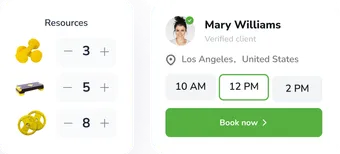Coaching as a profitable business idea
With the growing demand for personal development, coaching offers a valuable service that can profoundly impact people's lives. Here are some key reasons why coaching is a handy business idea:
Personalized approach. Coaching is profitable, offering a highly personalized approach to individual needs and goals. Each client is unique, with their own set of challenges, aspirations, and circumstances. As a coach, you can tailor your services to meet your client's requirements, providing customized strategies, support, and accountability. This personalized approach enhances client satisfaction and fosters long-term relationships.
Tangible results. Coaching is renowned for delivering real and measurable results. Through a collaborative partnership between coach and client, coaching facilitates self-reflection, goal setting, and action planning. By providing guidance, tools, and support, coaches empower individuals to overcome obstacles, develop new skills, and make sustainable changes. Witnessing clients achieve their goals and experience personal growth is immensely rewarding and reinforces the value of coaching.
Versatility and market demand. Coaching is a versatile business idea that can be applied to various niches and industries. Whether it's life, executive, career, or health coaching, there is a wide range of potential markets and client demographics to target. Furthermore, the demand for coaching continues to grow as individuals seek guidance and support in career transitions, work-life balance, personal relationships, and overall well-being.
Flexibility and scalability. Coaching offers flexibility in terms of working arrangements and scalability. As a coach, you can set your schedule, work with clients remotely or in person, and choose your preferred coaching methods and tools. Additionally, coaching can be scaled by expanding your client base, hiring and training additional coaches to work under your brand, or creating digital products such as online courses or e-books.
Continuous learning and personal growth. You embark on a constant education and personal growth journey as a coach. To provide the best support to your clients, you must stay updated on the latest coaching methodologies, theories, and techniques. This commitment to ongoing learning enhances your coaching skills and expands your knowledge and understanding of human behavior, motivation, and development.
Mostly courses, sometimes a bachelor's degree. Usually, it is enough to get a coaching certificate and be an expert in the field you plan to teach. Higher education is a benefit but only sometimes required.
Coaching is very profitable, especially if you build the sales funnel correctly. On average, a personal coach earns $70-100 per hour. When fully loaded, such specialists receive starting from $4,000 per month.
The bright idea for business management is connecting to a CRM system that will quickly and efficiently organize online appointments, making life easier for the coach and his clients. EasyWeek scheduling software and CRM is an excellent option for starting and running a coaching business.

Types of Coaches
Here are the most common areas of coaching:
Career Coach. Career coaches assist individuals in navigating their professional paths. They guide career exploration, job search strategies, resume writing, interview preparation, and career development. Career coaches help clients align their skills, interests, and values with their career goals.
Executive Coach. Executive coaches work with business executives and leaders to enhance their leadership skills, strategic thinking, and overall performance. They provide support in areas such as decision-making, communication, team management, and organizational effectiveness.
Health and Wellness Coach. Health and wellness coaches focus on supporting individuals in achieving and maintaining optimal physical and mental well-being. They assist clients in setting health goals, improving lifestyle habits, managing stress, and making sustainable changes to enhance overall wellness.
Financial Coach. Financial coaches help individuals and families improve their financial literacy, develop budgeting skills, and create strategies for debt reduction and wealth accumulation. They guide financial goal-setting, investment planning, and money management.
Relationship Coach. Relationship coaches work with individuals and couples to improve interpersonal dynamics and strengthen relationships. They help clients develop practical communication skills, resolve conflicts, navigate dating and marriage, and enhance emotional intimacy.
Performance Coach. Performance coaches focus on helping individuals and teams optimize their performance in specific areas, such as sports, arts, or business. They assist clients in setting goals, developing strategies, improving focus and motivation, and overcoming performance barriers.
Leadership Coach. Leadership coaches specialize in supporting individuals in leadership roles to enhance their leadership capabilities, influence, and impact. They work with clients to develop leadership skills, build self-confidence, improve decision-making, and cultivate effective team management.
Parenting Coach. Parenting coaches assist parents in navigating the challenges of raising children and building positive parent-child relationships. They guide topics such as discipline strategies, effective communication, child development, and fostering a nurturing and supportive family environment.
Academic Coach. Academic coaches help students improve their study skills, time management, and academic performance. They provide strategies for goal setting, organization, test preparation, and overall academic success.
No matter what type of coaching you do, you need a system to keep track of your clients and make appointments.

CRM software for coaches
CRM (Customer Relationship Management) software is valuable for coaches to manage client relationships, streamline administrative tasks, and enhance coaching business operations. Here are some key features and considerations when selecting a proper software for coaches:
Client Management. Look for a system that efficiently manages customer information, including contact details, session notes, progress tracking, and communication history. A centralized client database helps you stay organized and provides easy access to client information when needed.
Scheduling and Calendar Integration. Choose a service that offers scheduling features, such as appointment setting, calendar integration, and automated reminders. This functionality helps you manage your coaching sessions effectively and reduces the chances of scheduling conflicts.
Task and Workflow Management. Look for a CRM with task management capabilities, allowing you to create to-do lists, set reminders, and track progress on various coaching-related tasks. Workflow automation features help streamline administrative processes, such as sending intake forms or follow-up emails, saving you time and effort.
Communication and Messaging. Ensure that the software facilitates seamless communication with your clients. Features like email integration, messaging functionality, and client portals can enable efficient and secure communication, making sharing resources, scheduling sessions, and addressing client queries easier.
Reporting and Analytics. Consider a CRM system that provides reporting and analytics features to track key metrics and measure the success of your coaching business. Insights on client progress, session outcomes, and financial performance can help you make data-driven decisions and improve your coaching services.
Integration and Customization. Evaluate whether the CRM software integrates with other tools and platforms you use, such as email marketing software, payment processors, or video conferencing tools. Additionally, check if the program allows customization to adapt to your specific coaching processes and terminology.
Data Security and Privacy. Given the sensitive nature of client information, prioritize CRM software that accents data security and privacy. Look for features like data encryption, user access controls, and compliance with relevant data protection regulations (e.g., GDPR).
Scalability and Pricing. Consider the scalability as your coaching business grows. Ensure the software can accommodate increasing clients and offers pricing plans aligning with your budget and business needs.
When selecting a CRM software, take advantage of free trials or demos to assess the user-friendliness and compatibility with your coaching business. For example, EasyWeek software offers a free trial, during which you can test CRM and decide whether it is a good option in your case.

EasyWeek – best scheduling program for coaches
EasyWeek is a European appointment scheduling software that offers basic and pro-CRM features and flexible tariffs for small and medium businesses. When you launch a startup, the software constantly gets new users, increasing the audience to +300% yearly. It is the best proof of quality, as customers increasingly trust EasyWeek.
What does EasyWeek offer:
Online appointments. Your business will be reachable 24/7.
Free website. It is created automatically when signing up.
Customizable widget. Colors, icons, and wallpapers to fit your brand.
4K+ integrations. Including Google and Meta services.
Group booking feature. Handy for conferences and related events.
Instant notifications. SMS, email, and Push.
Marketing tools. Option of loyalty program and special offers creation.
EasyWeek is a handy tool for coaches and many other businesses that work with clients. It offers not only scheduling features but also promotion and retention helpers. The service also provides a free plan for personal coaches, which includes 1 employee and 1 location, a basic planner, website creation, and a booking widget. If you have more than 1 branch or more employees, look at the EasyWeek professional tariff plans. They are more flexible and offer handy team management tools.
Test EasyWeek – a handy, accessible, and beneficial tool for your coaching business.















